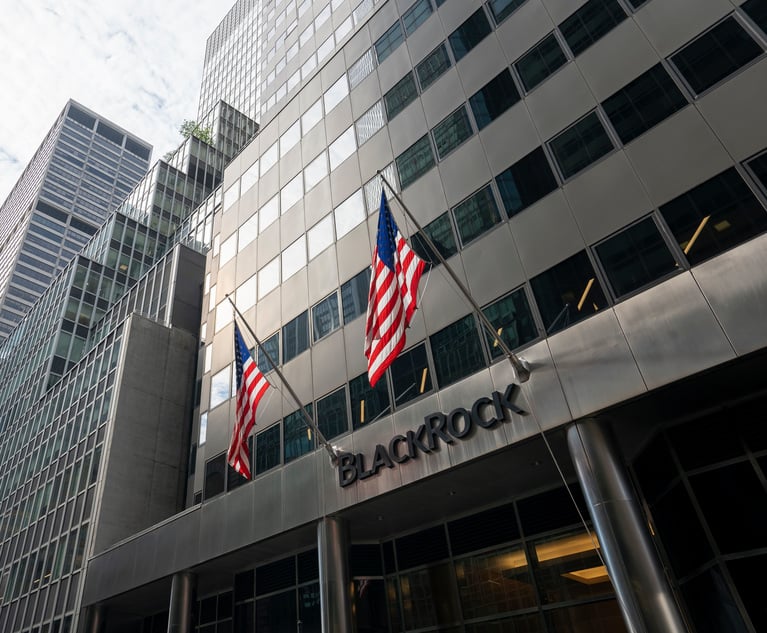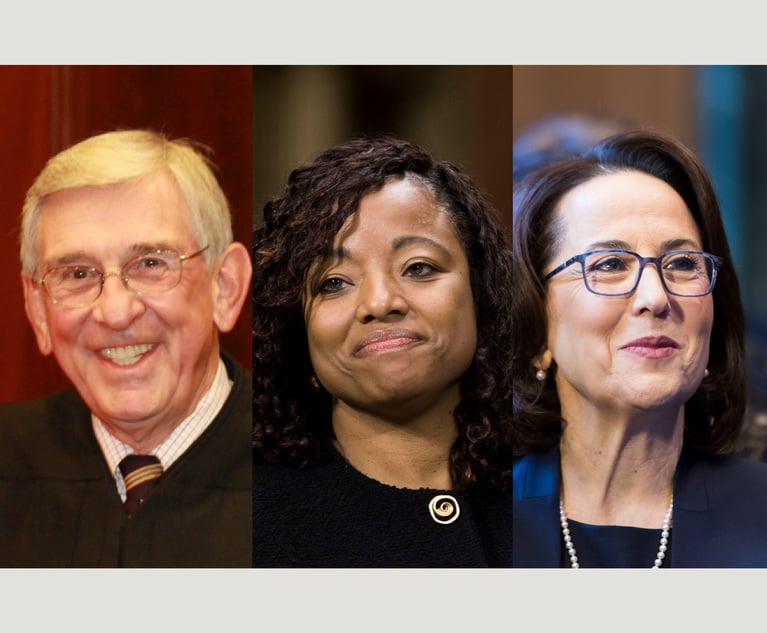'Oysters Le Burger'? SCOTUS Cookbook Reveals Justices' Food Traditions and Recipes
The new book “Table for 9” recounts the history of the U.S. Supreme Court's dining traditions, and throws in some recipes to boot. The book's worth a read as much for the glimpses it gives into the lives of the justices as the recipes that are included.
December 18, 2017 at 12:09 PM
5 minute read
 Joined by Justices Elena Kagan, Ruth Bader Ginsburg and Sonia Sotomayor, retired justice Sandra Day O'Connor lifts up the Seneca Women Global Leadership Award she received. (2015). Photo: Photo: Diego M. Radzinschi/NLJ
Joined by Justices Elena Kagan, Ruth Bader Ginsburg and Sonia Sotomayor, retired justice Sandra Day O'Connor lifts up the Seneca Women Global Leadership Award she received. (2015). Photo: Photo: Diego M. Radzinschi/NLJ
Soon after the U.S. Supreme Court's first session in 1790 in New York City, the justices repaired to nearby Fraunces Tavern for dinner and 13 toasts.
Thus began a tradition that continues today, of justices eating together regularly—certainly more than in most workplaces.
A just-published book aptly named “Table for 9” recounts the history of that tradition, and throws in some recipes to boot. The author is Clare Cushman, the Supreme Court Historical Society's publications director, whose previous books have also chronicled the human side and biographies of justices through history.
In this new book, Cushman has done it again, and it is worth a read, as much for the glimpses it gives into the lives of the justices as the recipes that are included.
Where else could one find photos of teenage Sandra Day (the future Justice O'Connor) eating lunch out in a field with ranch hands at the Lazy B Ranch? Or: Antonin Scalia showing off his hunting prowess; Sonia Sotomayor cooking Chinese food while a student at Yale Law School; Warren Burger, eating a formal lunch alone in his chambers; and justices admiring a 28-pound king salmon that Stephen Breyer caught while at an Alaska bar association meeting in 2001.
O'Connor is the heroine of the book in some ways. The tradition of justices eating lunch together had waxed and waned in the years since the Supreme Court building—complete with a private dining room—opened in 1935. But O'Connor, who arrived in 1981, worked mightily to revive the tradition.
Justice Clarence Thomas recalled balking at the idea, but soon caved. “Now you have a group of people who really enjoy each other's company,” Thomas said.
The book offers a priceless chart of the lunch preferences of justices current and past. Chief Justice Charles Evans Hughes ate one poached egg and a glass of milk every day, and retired Justice David Souter also had an unbreakable habit: he would famously eat plain, nonfat yogurt and an apple in its entirety, including seeds. Scalia described Souter's lunch as “disgusting.”
Some of the recipes are grim, truth be told—a reflection, perhaps, of the dull taste buds of pre-foodie Washington. Burger, a wine connoisseur, inflicted upon his colleagues a dish called “Oysters Le Burger,” a mishmash that combined oysters, frozen chopped spinach, Lawry's seasoned salt, sherry and dozen other ingredients.
The recipe for Justice Robert Jackson's favorite lunch was a lot simpler, though just as unappetizing: “Pick cowslip leaves; Wash them if you wish; Plunk them between two slices of home-baked bread.” (Cowslip is a little-known herb that can double as a salad green.)
A beef jerky recipe offered by O'Connor's brother Alan Day is also a mystery, consisting of beef purchased at Costco that is sliced and dipped in an unnamed sauce whose ingredients he would not reveal. “I have a file with a recipe in it, but that's only to be opened after I turn to cowboy dust,” Day wrote.
O'Connor herself upped the quality of Supreme Court cooking with recipes for dishes like California Green Chile and Cheese Pie, and Chalupas—even though two cans of cream of mushroom soup found their way into the ingredient list.
Martin Ginsburg, the late husband of Justice Ruth Bader Ginsburg, is also featured in the book. He taught himself classic French cooking “out of self-preservation” because Ruth Ginsburg had little interest in cooking. After he died in 2010, Martha-Ann Alito and the society compiled his recipes into a book titled “Chef Supreme.”
Louise Gorsuch, the British-born wife of new Justice Neil Gorsuch, also made a cameo appearance in the book. She offered her own recipe for orange marmalade, devised when she moved from Britain 20 years ago. “When I moved to America,” she wrote, “I found the marmalade in the stores too sweet so I started making my own.”
Read more:
This content has been archived. It is available through our partners, LexisNexis® and Bloomberg Law.
To view this content, please continue to their sites.
Not a Lexis Subscriber?
Subscribe Now
Not a Bloomberg Law Subscriber?
Subscribe Now
NOT FOR REPRINT
© 2025 ALM Global, LLC, All Rights Reserved. Request academic re-use from www.copyright.com. All other uses, submit a request to [email protected]. For more information visit Asset & Logo Licensing.
You Might Like
View All
US Courts Announce Closures in Observance of Jimmy Carter National Mourning Day
2 minute read
Who Got the Work: Gibson Dunn and Wilmer to Defend BlackRock in ESG Antitrust Lawsuit
2 minute read
New York Times Moves for $100K in Attorney Fees Against Dfinity Foundation
3 minute read
Split 4th Circuit Revives Constitutional Challenge to Child Vaccine Mandate
Trending Stories
- 1Restoring Trust in the Courts Starts in New York
- 2'Pull Back the Curtain': Ex-NFL Players Seek Discovery in Lawsuit Over League's Disability Plan
- 3Tensions Run High at Final Hearing Before Manhattan Congestion Pricing Takes Effect
- 4Improper Removal to Fed. Court Leads to $100K Bill for Blue Cross Blue Shield
- 5Michael Halpern, Beloved Key West Attorney, Dies at 72
Who Got The Work
Michael G. Bongiorno, Andrew Scott Dulberg and Elizabeth E. Driscoll from Wilmer Cutler Pickering Hale and Dorr have stepped in to represent Symbotic Inc., an A.I.-enabled technology platform that focuses on increasing supply chain efficiency, and other defendants in a pending shareholder derivative lawsuit. The case, filed Oct. 2 in Massachusetts District Court by the Brown Law Firm on behalf of Stephen Austen, accuses certain officers and directors of misleading investors in regard to Symbotic's potential for margin growth by failing to disclose that the company was not equipped to timely deploy its systems or manage expenses through project delays. The case, assigned to U.S. District Judge Nathaniel M. Gorton, is 1:24-cv-12522, Austen v. Cohen et al.
Who Got The Work
Edmund Polubinski and Marie Killmond of Davis Polk & Wardwell have entered appearances for data platform software development company MongoDB and other defendants in a pending shareholder derivative lawsuit. The action, filed Oct. 7 in New York Southern District Court by the Brown Law Firm, accuses the company's directors and/or officers of falsely expressing confidence in the company’s restructuring of its sales incentive plan and downplaying the severity of decreases in its upfront commitments. The case is 1:24-cv-07594, Roy v. Ittycheria et al.
Who Got The Work
Amy O. Bruchs and Kurt F. Ellison of Michael Best & Friedrich have entered appearances for Epic Systems Corp. in a pending employment discrimination lawsuit. The suit was filed Sept. 7 in Wisconsin Western District Court by Levine Eisberner LLC and Siri & Glimstad on behalf of a project manager who claims that he was wrongfully terminated after applying for a religious exemption to the defendant's COVID-19 vaccine mandate. The case, assigned to U.S. Magistrate Judge Anita Marie Boor, is 3:24-cv-00630, Secker, Nathan v. Epic Systems Corporation.
Who Got The Work
David X. Sullivan, Thomas J. Finn and Gregory A. Hall from McCarter & English have entered appearances for Sunrun Installation Services in a pending civil rights lawsuit. The complaint was filed Sept. 4 in Connecticut District Court by attorney Robert M. Berke on behalf of former employee George Edward Steins, who was arrested and charged with employing an unregistered home improvement salesperson. The complaint alleges that had Sunrun informed the Connecticut Department of Consumer Protection that the plaintiff's employment had ended in 2017 and that he no longer held Sunrun's home improvement contractor license, he would not have been hit with charges, which were dismissed in May 2024. The case, assigned to U.S. District Judge Jeffrey A. Meyer, is 3:24-cv-01423, Steins v. Sunrun, Inc. et al.
Who Got The Work
Greenberg Traurig shareholder Joshua L. Raskin has entered an appearance for boohoo.com UK Ltd. in a pending patent infringement lawsuit. The suit, filed Sept. 3 in Texas Eastern District Court by Rozier Hardt McDonough on behalf of Alto Dynamics, asserts five patents related to an online shopping platform. The case, assigned to U.S. District Judge Rodney Gilstrap, is 2:24-cv-00719, Alto Dynamics, LLC v. boohoo.com UK Limited.
Featured Firms
Law Offices of Gary Martin Hays & Associates, P.C.
(470) 294-1674
Law Offices of Mark E. Salomone
(857) 444-6468
Smith & Hassler
(713) 739-1250










